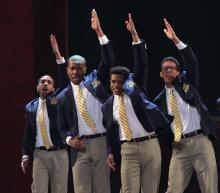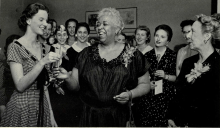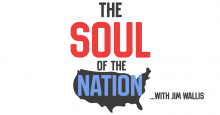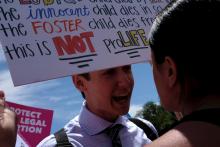Opinion

White violence in all forms must be named, particularly white, male violence.

As I was growing up in an evangelical church, one of my pastors’ favorite scriptures to use to wake up a congregation and remind us to keep going was the “run-the-race” scripture. In Hebrews 12, we are instructed to “run with perseverance the race marked out for us, fixing our eyes on Jesus, the pioneer and perfecter of faith.” But I was never a runner — or, in fact, had any athletically inclined bone in my body — and I desperately needed a different metaphor, something that I felt would teach me to carry on my faith in a sustainable way.

Good theater contains a strain of that gospel antidote, that powerful tradition of trying to name and recognize our demons and human propensities. The earnestness in story that pairs what we believe with what we do, can serve as a way to handle truths about ourselves and our dealings that make us uncomfortable. Often written off as fluffy and as a less effective means of activism, the tradition of plays and musicals has the power to stage an inner confrontation in real time, asking the audience to contend with a hard truth or recasting a social norm we seldom question.

My family walks a palimpsest, on translations and mistranslations of rivers, of people, of places, of faith. My family walks on unfinished words that have yet to be formed, stuck on molar, in mouths, being shaped by tongues that twist two into one. My family walks on places unfinished and already traversed.

Whatever faults Black Protestantism has had, its grand strength is in its exercise of democratic debate internal to black Americans about the meaning of the good life and who gets a say in the shaping of that life, including perspectives from other faiths.

Leaders at the forefront of the fight for social justice need to learn to lead courageous dialogue about race.

The continued demise of faith in this nation’s criminal justice system, elected officials, and government will increase wherever injustice is maintained in the name of “doing just enough”. If America is truly to be one nation, it must address and correct its patterns of injustice and persistent denials of full personhood for those who belong in this country and society.

As a Christian clergy who celebrates all the spiritual paths that lead to Love; as a woman who was unable to conceive and who grieved for years; as an aunt and grandmother who thinks children are precious, I resonate with the feelings of those who identify as pro-choice and pro-life.

The news on Friday was devastating: There had been yet another mass shooting, this time in Virginia Beach, and 12 people were killed. Many of us had the same painful reactions of grief for the families, fear that this could happen to someone I love one day, anger at the gun manufacturers whose influence through the NRA makes them complicit in both the mass shootings and the daily epidemic of gun violence.

Dr. Scott Warren is defending himself against three felony charges including conspiracy to transport and harbor migrants — charges that could add up to 20 years in prison.

Removing Trump from power is a task central to the soul of the nation — and to the integrity of faith.

Significantly, official restrictions on Muslim women’s dress don’t satisfy these basic requirements. From Belgium to Kazakhstan to Kenya, education is unavailable and inaccessible to students who choose attire that the government disfavors. If they are forced to pursue studies in private institutions with sometimes inferior resources, curricula, and instruction, then education is more likely to be unacceptable.

I watched Ava DuVernay’s Netflix series When They See Us and found myself angered by the people and systems that had a role in the incarceration of five innocent boys. The Central Park Five, Raymond Santana, Kevin Richardson, Antron McCray, Yusef Saalam, and Korey Wise, were wrongfully convicted and later exonerated of a variety of charges related to the rape and assault of a white female jogger in 1989. While the series itself honors the stories of the Central Park Five, in choosing to title the series When They See Us, DuVernay invites us into a broader conversation on the criminalization and mass incarceration of young boys and girls of color, and challenges us to define our own role within this system.

The “I” word, which Donald Trump calls it, is, of course, “impeachment” — the constitutional process of charging and, then in the Senate, convicting, a president for abusing the public trust and committing wrongdoing. The Constitution says that a president “shall be removed from Office on Impeachment for, and Conviction of, Treason, Bribery, or other high Crimes and Misdemeanors.” That is what is politically required — as the specifics for impeachment are ultimately politically decided. The other key word here is “crimes,” and who has the authority to conclude that they have been done by a president.

In John 10:10, Jesus says "I am come that they might have life, and that they might have it more abundantly."

The promise of Field of Dreams is that when we give ourselves to serving the common good at the place where our “deep gladness and the world’s hunger meet,” as Frederick Buechner writes, we don’t just help advance the healing of the people we touch, we also begin to heal our pain.

My high school alma mater is not an anti-Semitic or Islamophobic school, as far as I know. But its mascot is.

The student debt crisis in America is currently at its worst, making it more difficult for minorities, specifically African Americans, to attend four year colleges — especially private institutions as Morehouse College. It is estimated the average full-time tuition at Morehouse was $25,368 in the latest academic year. But with other expenses like room and board, books, and fees, the total can be above $48,000.

Impeachment suggests charging a president with misconduct that would disqualify them from public office — that’s not what Filipinos as asking for. Unseating Dutarte from office implies that there is a need for people power — a movement to assert democracy and not merely hang ones hopes in a system that has been known to fail or serve only a few. Impeachment calls the government to act, “unseat” calls the general masses to protest and hold government accountable.

“Life” issues have once again become extremely politically divisive. Claiming to be either “for the women” or “for the babies,” turns empathy for only one life into single-issue voting on both sides of the political spectrum. Instead of reducing abortion access to a political football — and even into competing billboards on national highways — we all should seek to expand and deepen the conversation, especially Christians, who should not be beholden to right or left but rather to a consistent ethic of life for women and children.